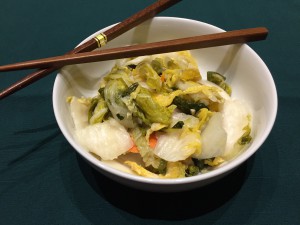Humans have been fermenting foods for thousands of years as a means to preserve food, enhance its flavor or to make alcoholic beverages. Many types of plant foods can be fermented, including:
- Soybeans: soy sauce, miso and tempeh
- Grains: beer, bread made with yeast, whisky, vodka
- Vegetables: kimchi, sauerkraut, beets, carrots and more…
- Fruits: wine, vinegar, cider, brandy
- Tea: kombucha
Even chocolate is fermented! The cacoa seeds are fermented to develop flavor and reduce bitterness.
Fermentation is a metabolic process in which sugars are converted to acids, gases or alcohol via yeast or bacteria. In lacto-fermentation, lactobacillales, a bacteria found in plants and animals, converts sugars into lactic acid. This acid inhibits the growth of harmful bacteria, therefore preventing spoilage.
Health benefits of fermented vegetables
Fermented vegetables, also known as raw cultured vegetables, are great for your digestive health. They contain “friendly” bacteria such as probiotic products which balance the bacteria in your digestive system. The acid pre-digests the food making it easier for your gut to absorb nutrients. According to PCRM.org and Tufts University, they:
- are high in enzymes which help with digestion
- improve the absorption of minerals
- preserve or enhance the vitamins in the food
- improve the health of cells in the intestine
- improve immune function
- reduce the risk of colon cancer
What about people with candida overgrowth. Should they eat fermented vegetables?
Yes. According to Dr. Gabriel Cousins in Conscious Eating “one way that cultured vegetables are so good for us is that they prevent the yeast, Albicans candida, and the pathogenic bacteria from taking over the colon and creating endotoxins that suppress the immune system.”
What is the difference between fermentation and pickling?
Pickled foods are made by adding an acid such as vinegar (acetic acid) in the processing. These foods are not fermented. However, fermented foods create their own acid, lactic acid, so they are both fermented and pickled!
Is it best to make or buy your fermented vegetables?
Home fermentation of vegetables does not use pressure or heat like many store-bought varieties. The pressure and heat destroys nutrients. If you do purchase these items from a store, opt for the ones in the refrigerated section.
So enjoy you fermented veggies and if you want to give it a try, here are recipes for basic sauerkraut and vegan kimchi.


Reblogged this on Your Health and Joy . Coach Patricia Joy Becker and commented:
From our like-minded friends